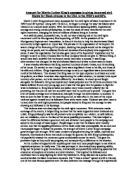An evaluation, comparing and contrasting King's themes and techniques with Woodgate's.
Woodgate chose the topic of conflict between today's youths as it is a issue about which he feels passionate and which the audience and later readers could relate to and understand.
'We need to fight this oppression, which has now become an everyday occurrence in our society.' Woodgate's techniques are very similar to King's, however, I feel that King's unwavering certainty and ambition in his dynamic and influential vocabulary is more effective in motivating the audience and later readers, 'As we walk, we must make the pledge that we shall march ahead. We cannot turn back!'
Both Woodgate and King have a plentiful supply of imagery in their speeches to grasp attention and create interest. Woodgate describes the hostility and jeering as 'vicious, rabid hyenas' and similarly, King depicts racial injustices as "quicksands" in "the valley of despair."
Woodgate chose the topic of conflict between today's youths as it is a issue about which he feels passionate and which the audience and later readers could relate to and understand.
'We need to fight this oppression, which has now become an everyday occurrence in our society.' Woodgate's techniques are very similar to King's, however, I feel that King's unwavering certainty and ambition in his dynamic and influential vocabulary is more effective in motivating the audience and later readers, 'As we walk, we must make the pledge that we shall march ahead. We cannot turn back!'
Both Woodgate and King have a plentiful supply of imagery in their speeches to grasp attention and create interest. Woodgate describes the hostility and jeering as 'vicious, rabid hyenas' and similarly, King depicts racial injustices as "quicksands" in "the valley of despair."







